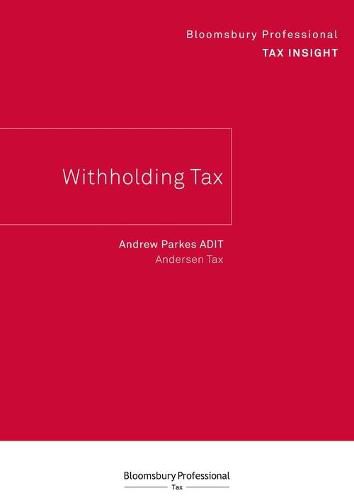Readings Newsletter
Become a Readings Member to make your shopping experience even easier.
Sign in or sign up for free!
You’re not far away from qualifying for FREE standard shipping within Australia
You’ve qualified for FREE standard shipping within Australia
The cart is loading…






UK withholding tax is a method of collecting tax at source from the person who makes a payment instead of raising an assessment on the recipient. It is is an effective way for tax authorities (HMRC) to collect tax. It passes the administrative burden onto the person making the payment (the payer) to:
withhold the appropriate amount of income tax from the payment
account for such tax to HMRC
submit returns to HMRC containing information on the amounts paid and withheld in respect of UK tax, and issue tax statements or certificates to the recipient informing them of the amount of the payment and the amount of the tax deducted even though the tax is due in respect of income belonging to the recipient.
As a general rule, UK domestic law requires companies making payments of interest to withhold tax at 20%
Withholding tax is an income tax that often affects companies. It doesn’t fit neatly into publications aimed at income tax, where corporation tax practitioners may miss it, or corporation tax, as it is strictly income tax and has relevance for individuals.
Covers the following issues:
The guidance is illustrated by the use of diagrams and flow charts and case studies. Relevant case summaries are referenced throughout.
$9.00 standard shipping within Australia
FREE standard shipping within Australia for orders over $100.00
Express & International shipping calculated at checkout
UK withholding tax is a method of collecting tax at source from the person who makes a payment instead of raising an assessment on the recipient. It is is an effective way for tax authorities (HMRC) to collect tax. It passes the administrative burden onto the person making the payment (the payer) to:
withhold the appropriate amount of income tax from the payment
account for such tax to HMRC
submit returns to HMRC containing information on the amounts paid and withheld in respect of UK tax, and issue tax statements or certificates to the recipient informing them of the amount of the payment and the amount of the tax deducted even though the tax is due in respect of income belonging to the recipient.
As a general rule, UK domestic law requires companies making payments of interest to withhold tax at 20%
Withholding tax is an income tax that often affects companies. It doesn’t fit neatly into publications aimed at income tax, where corporation tax practitioners may miss it, or corporation tax, as it is strictly income tax and has relevance for individuals.
Covers the following issues:
The guidance is illustrated by the use of diagrams and flow charts and case studies. Relevant case summaries are referenced throughout.